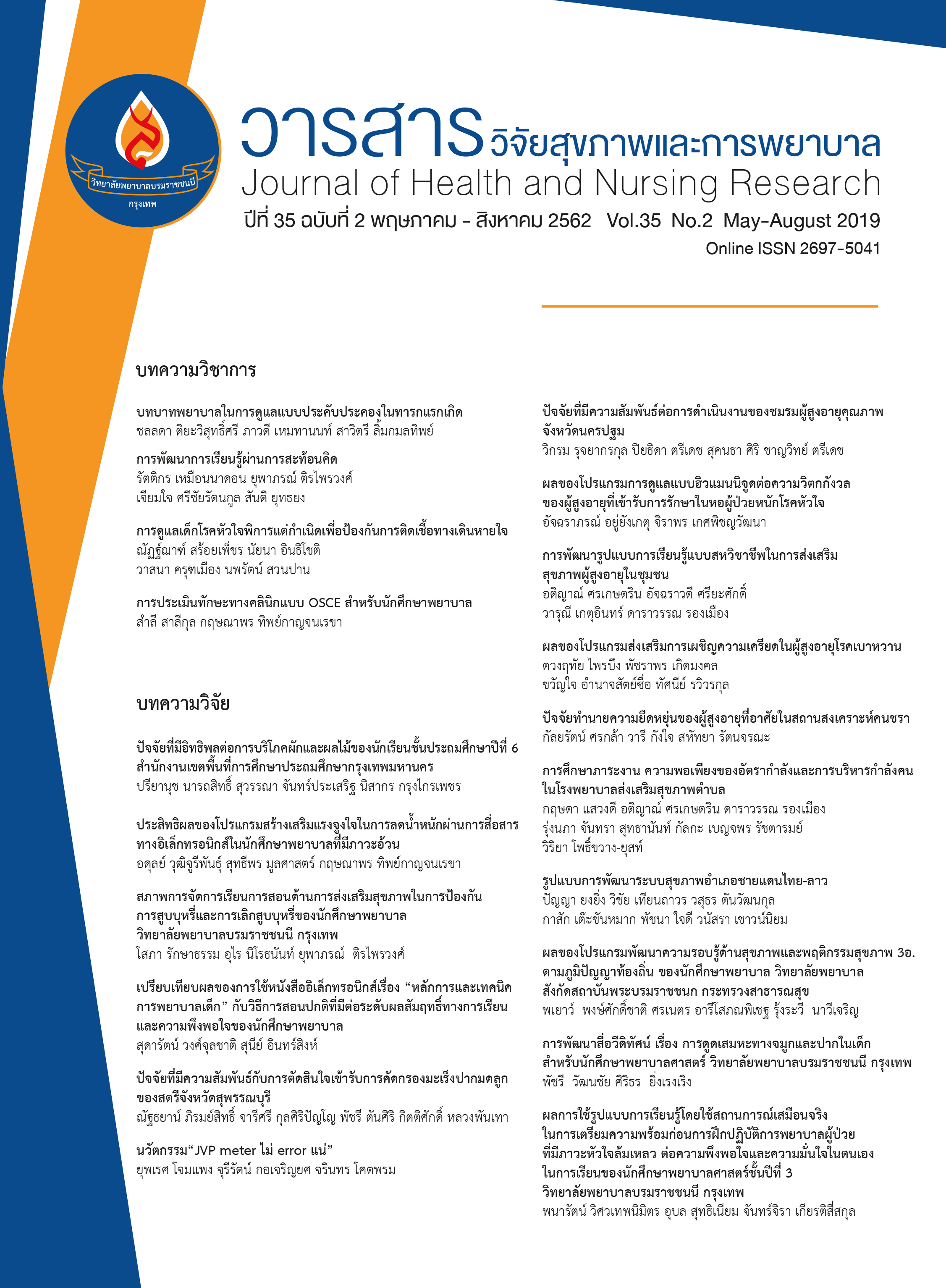ผลของโปรแกรมส่งเสริมการเผชิญความเครียดในผู้สูงอายุโรคเบาหวาน
คำสำคัญ:
โรคเบาหวาน, ความสามารถในการเผชิญความเครียด, ทฤษฎีการเผชิญความเครียดบทคัดย่อ
การวิจัยนี้เป็นการวิจัยกึ่งทดลองแบบ 2 กลุ่มเปรียบเทียบ วัดผลก่อนและหลังการทดลอง มีวัตถุประสงค์เพื่อศึกษาผลของโปรแกรมส่งเสริมการเผชิญความเครียดในผู้สูงอายุโรคเบาหวาน อำเภอไพรบึง จังหวัดศรีสะเกษ กลุ่มตัวอย่างคือผู้สูงอายุ อายุ 60-79 ปี เป็นโรคเบาหวานที่มีเกณฑ์ความเครียดระดับปานกลางขึ้นไปสุ่มตัวอย่างโดยวิธีการสุ่มอย่างง่ายได้กลุ่มทดลองจำนวน 30 คน กลุ่มควบคุมจำนวน 30 คน กลุ่มทดลองได้รับโปรแกรมส่งเสริมการเผชิญความเครียด ตามแนวคิดของลาซารัสและโฟร์คแมน เป็นเวลา 5 สัปดาห์ กลุ่มควบคุมได้รับบริการตามปกติ เก็บข้อมูลโดยใช้แบบสัมภาษณ์ก่อนการทดลองและหลังการทดลองในสัปดาห์ที่ 5 เก็บข้อมูลโดยใช้แบบสอบถามก่อนทดลอง หลังทดลอง และ วิเคราะห์สถิติด้วยร้อยละ ค่าเฉลี่ย ส่วนเบี่ยงเบนมาตรฐาน Chi-square Independent t-test และ paired t- test
ผลการศึกษาพบว่า ระยะหลังการทดลอง กลุ่มทดลองมีคะแนนเฉลี่ยของระดับความเครียดน้อยกว่า ก่อนการทดลอง และน้อยกว่ากลุ่มควบคุมอย่างมีนัยสำคัญทางสถิติที่ระดับ .001 และในระยะหลังการทดลอง กลุ่มทดลองมีคะแนนเฉลี่ยของความสามารถในการเผชิญความเครียด สูงกว่าก่อนการทดลองและ สูงกว่ากลุ่มควบคุมอย่างมีนัยสำคัญทางสถิติที่ระดับ .05 ผลการศึกษาสรุปได้ว่า โปรแกรมส่งเสริมการเผชิญความเครียด มีผลต่อการเปลี่ยนแปลงความสามารถในการเผชิญความเครียด และระดับความเครียดของผู้สูงอายุโรคเบาหวาน ดังนั้นโปรแกรมนี้พยาบาลเวชปฏิบัติชุมชนสามารถนำไปประยุกต์ใช้ในการดูแลผู้ป่วยโรคเรื้อรังในชุมชนอื่นๆ ได้
Downloads
เอกสารอ้างอิง
2. Bureau of elderly health, Department of Health, Ministry of public health. Thai elderlies well-being survey report of 2013. Bangkok: Wacharin P.P.; 2013. (in Thai).
3. Buraphunt R, Muangsom N. Factors affecting uncontrolled type 2 diabetes mellitus of patiants in
Sangkhom Hospital, Udonthani province. KKU Journal for Public Health Research. 2013; 6(3):
102-9. (in Thai).
4. Katon W, Paul C. Impact of major depression on chronic medical illness. J Psychosom Res. 2009;53: 903-6.
5. Bumrungsakulsawas O, Lithongin K, Akewanit T, Banpuan W, Lapbenchakul S, Chareunket W,
et al. Long term care. Bangkok: National Health Security Office; 2016. (in Thai).
6. Phraibueng Hospital. NCDs clinic quality assessment data. Sisaket: Department of family clinical
practice and community, Phraibueng Hospital; 2015. (in Thai).
7. Berkel HV. The relationship between personality, coping styles and stress, anxiety and depression [Dissertation]. Canterbury: University of Canterbury; 2009.
8. Phengyot S. The results of mental health promotion activities for stress management in Phaisali
Hospital Diabetes mellitus patients group. Thesis for the Degree of Master of Education program
in Health promation. Graduate school of Nakhon Sawan Rajabhat University; 2007. (in Thai).
9. Folkman S, Lazarus RS. Stress, appraisal, and coping. New York: Springer Publishing Company; 1984.
10. Jalowiec A, Powers M. Stress and coping in hypertensive and emergency room patients. Nursing Res. 1981; 30(1):1-10.
11. Prungdech S. Relationships between coping behaviors and compliance in essential hypertensive patiants. Thesis for the Degree of Master of Nursing Science program in Nursing. Graduate school of Mahidol University; 2010. (in Thai).
12. Mahatnirunkul S, Pumpaisalchai W, Tapunya P. Suan Prung stress test Research Report. Chiang Mai:Suan Prung Hospital; 1997. (in Thai).
13. Soongkote P.The effects of meditation on stress in patiants with hypertention in Nonkun Hospital,Sisaket. Thesis for the Degree of Master of Nursing Science program in Adult Nursing.
Graduate school of Khon Kaen University; 2007. (in Thai).
14. Yongthong N. The effect of a coping enhancing program on depression in breast cancer patiants.J Nurs Sci 2013;31(3):27-36. (in Thai).
ดาวน์โหลด
เผยแพร่แล้ว
รูปแบบการอ้างอิง
ฉบับ
ประเภทบทความ
สัญญาอนุญาต
บทความที่ได้รับการตีพิมพ์ เป็นลิขสิทธิ์ของวารสารวิจัยสุขภาพและการพยาบาล (วิทยาลัยพยาบาลบรมราชชนนี กรุงเทพ) ไม่สามารถนำไปตีพิมพ์ซ้ำในวารสารฉบับอื่น


















